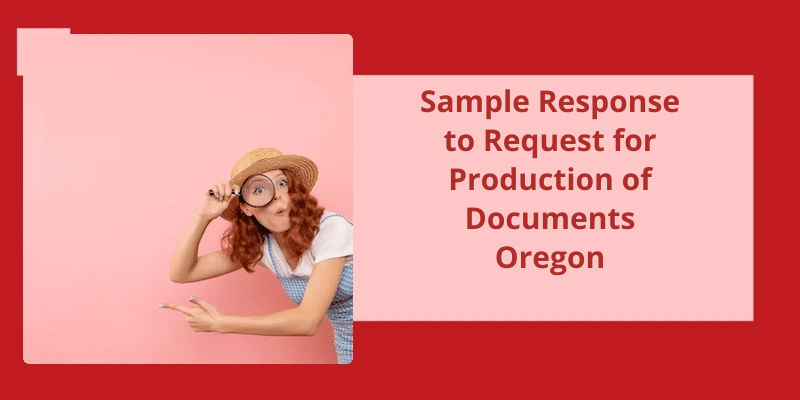As a legal practitioner in the state of Oregon, responding to a request for production of documents is a critical aspect of the discovery process. This request is usually presented during civil litigation and requires that the requested party produce specific documents related to the case. The documents requested can include anything from contracts, emails, and financial records, to photographs and video recordings. Properly responding to a request for production of documents isn’t only a legal obligation but also an essential part of building a strong case strategy. In this regard, it’s crucial to understand the legal principles and requirements of the state of Oregon in responding to this request. This article provides an overview of the key considerations and best practices to take into account when drafting a response to a request for production of documents in Oregon.
What Is an Example Response to Request for Production of Documents?
A Request for Production of documents is a legal tool utilized in the discovery phase of a lawsuit. It’s a formal request made by one party to another party, asking them to provide relevant and material documents pertaining to the case. This request seeks to obtain documents, records, and other tangible materials that may aid in the litigation process.
When responding to a Request for Production of documents, there are several standard responses that are typically used. One common response is the declaration that all requested documents that exist will be produced. This means that the responding party has conducted a thorough search and has collected and organized any and all documents that are relevant to the request.
This response acknowledges that there may be documents that exist that the responding party doesn’t have access to or control over. Nonetheless, it commits to providing all documents that can reasonably be collected.
In cases where some of the requested documents aren’t immediately available, a response indicating that additional documents have been requested and a deadline for production has been set is common. This response shows that the responding party is willing to cooperate and is making efforts to gather all of the requested materials.
When responding to a Request for Production of documents, it’s important to be transparent and diligent. A clear and thorough response can help avoid court orders and sanctions and facilitate a quicker resolution to the case. Additionally, failing to provide requested documents can lead to legal consequences and damage the credibility and reputation of the responding party.
How to Prepare a Request for Production of Documents
A Request for Production of documents is a legal request for the opposing party to produce certain documents relevant to a lawsuit. To prepare one, you should identify the specific documents you need and draft a clear and concise request using the appropriate legal language. It’s important to follow the rules and deadlines outlined by your jurisdiction and to serve the request on the opposing party in a proper manner.
Now that we’ve a clear understanding of what a notice to produce documents is, it’s important to delve into the legalities of document production. The production of documents is a crucial aspect in civil litigation as it allows parties to gain access to relevant information and evidence necessary in their case. However, there are specific rules and regulations that must be followed to ensure that the production process is fair and lawful. Let’s explore these regulations in more detail.
What Is Legal Production of Documents?
The legal production of documents is a process that occurs during a civil lawsuit. One party in the lawsuit may request that the other party produce certain documents that pertain to the case. This process is known as production of documents. The purpose of this process is to ensure that both parties have access to all the necessary information to present their case in court. The documents that are requested may include anything from contracts to emails or other forms of communication.
It ensures that both parties have access to relevant evidence which is necessary for the case. Discovery is important in a case because it allows the parties to obtain relevant information that may help to strengthen their case. The production of documents is just one component of the discovery process.
When one party requests the production of documents, they must do so in writing. The request must be specific regarding what documents they’re requesting and why they’re relevant to the case. Once the request is made, the other party is required to comply with the request within a specific timeframe.
The legal production of documents can be a complicated process, especially when dealing with large amounts of information. It’s important to have a legal team that understands the intricacies of the process and can help navigate it effectively. Failure to comply with a request for production of documents can lead to legal consequences, including sanctions and other penalties.
It’s important to understand how defendants respond to requests for production of documents in legal cases. Such a response typically consists of two parts and involves a detailed analysis of the requested items. This process requires careful consideration of legal guidelines and potential consequences of not complying with the request. Let’s explore the various aspects of this response in more detail below.
How Do Defendants Respond to Request for Production of Documents?
The second part of your response is actually producing the requested documents. This requires gathering, organizing and reviewing the documents. Depending on the quantity and complexity of the documents, this can be a time-consuming and costly process. Defendants must be careful to provide documents in a timely manner and in a form requested by the requesting party, or risk sanctions.
Another option for defendants is to provide a partial response to the request. This may involve producing some of the documents requested while claiming that others are confidential or privileged. Defendants must be careful when using this option, as they may be accused of withholding important documents and sanctioned accordingly.
This may be done if the defendant believes that the request is overly broad or burdensome, or if the requested documents aren’t relevant to the case. If the objection is successful, the requested documents won’t need to be produced.
Finally, defendants may seek a protective order to limit the scope of the request for production of documents. This is a court order that prevents the requesting party from seeking certain documents or limits the scope of the request. Seeking a protective order can be a complex and expensive process, and defendants should only pursue this option if they’ve a strong legal argument in their favour.
Defendants must carefully consider their response to each request, as failing to provide documents in a timely manner or objecting without legal justification can result in sanctions. Defendants should work closely with their legal team to ensure that their response is appropriate and effective.
Best Practices for Gathering, Organizing, and Reviewing Requested Documents
When gathering requested documents, it’s important to first identify which documents are required and their sources. It’s best to create a checklist or spreadsheet to track the requested documents and their status. Organize the documents in a logical and consistent manner so that they can be easily reviewed and accessed. When reviewing the documents, ensure that they’re complete, accurate, and meet the requested criteria. It’s also important to maintain confidentiality and security of the requested documents.
Source: Discovery: Responding to Requests for Production or Inspection
Conclusion
Additionally, complying with any objections or assertions of privilege is paramount. Failure to appropriately respond to a request for production of documents can result in sanctions or adverse consequences in litigation. Therefore, it’s recommended that parties seek the assistance of an experienced attorney to ensure compliance and protect their rights.






